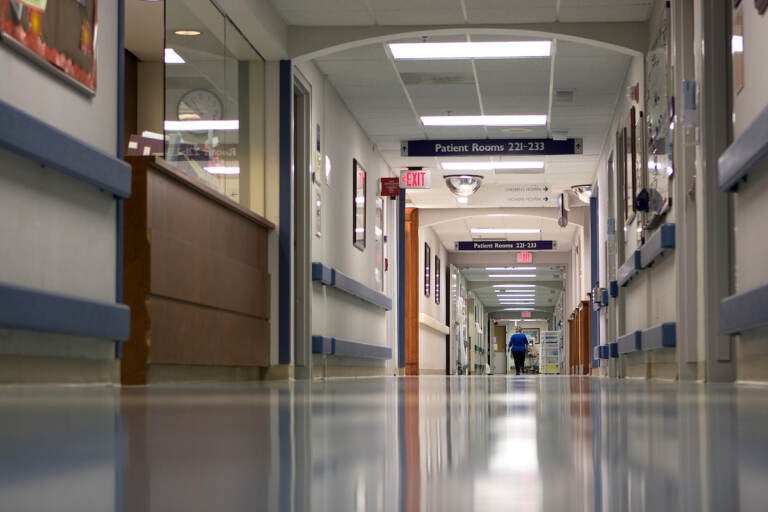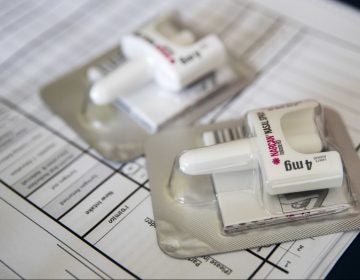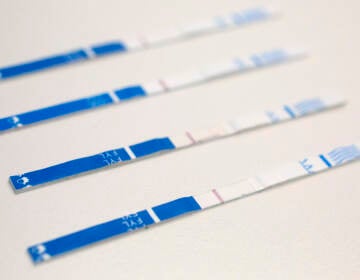Penn study finds ‘dramatic rise’ in patients with opioid addiction who leave hospitals early, against medical advice
People with opioid addiction are leaving hospitals against medical advice as often as one in six times, a significant rise over previous years.

File - A hospital hallway (Courtesy of Bigstock)
From Philly and the Pa. suburbs to South Jersey and Delaware, what would you like WHYY News to cover? Let us know!
People with an opioid addiction are more likely to leave the hospital early and against medical advice, before treatment for an injury or infection is complete, according to a new study.
It’s happening as often as one in every six hospital admissions — a number that researchers at the University of Pennsylvania call scary, and a “dramatic rise” from previous years.
The increase in early discharge rates is co-occurring with the rapid spread of fentanyl in street drug supplies in Philadelphia and across the country, said study author Dr. Ashish Thakrar, an addiction medicine specialist and UPenn assistant professor of medicine.
“There is an expectation a lot of them have that they will have untreated withdrawal, that they’ll have undertreated pain,” he said. “Many of them have had, frankly, stigmatizing experiences from health care providers who might be well intentioned, but who ultimately make a lot of these individuals feel like they don’t belong there.”
Fentanyl is a synthetic opioid up to 50 times more potent than heroin. Experts say it can cause severe withdrawal symptoms when there’s a delay between injections or doses.
Since the highly potent drug began showing up in street drugs a few years ago, Thakrar said he and his colleagues began noticing that more patients with opioid addiction were not staying in the hospital.
Researchers looked at hospital admissions and discharge records from 30 states for their study, published Dec. 4 in the Journal of the American Medical Association.
Data confirmed that patients living with addiction were leaving early about 10% to 17% of the time in 2020, compared to 5% to 10% of the time in 2016. The increase was most pronounced among patients with both an opioid use disorder and an infection related to injection drug use.
By contrast, less than 2% of patients in the general population are discharged against medical advice.
Research shows any patients who leave the hospital early are at a higher risk of being readmitted or dying within 30 days. For people who use drugs and have an infection, Thakrar said leaving prematurely can be especially risky.
“These are the exact patients we need to be focused on treating with more patient-centered and effective care,” he said, “because these are the exact patients at highest risk of overdose and frankly death if they are not able to access treatment in a patient-centered way.”
Over the years, more hospitals and health systems have embraced prescribing addiction treatment medications like methadone and buprenorphine, which can help manage withdrawal and pain.
But Thakrar said progress can be slow and these medications are still underutilized. He said building trust and addressing fears within a historically marginalized patient population can also take time.
“People who are going to make the effort to come to the hospital in the first place, they want to get medical care and they have overcome a lot of barriers to actually get to the hospital in the first place,” he said. “I think our job in the hospital as clinicians is to do everything we can to treat the withdrawal that they might have, treat the pain, treat the cravings or drug use that they might have, so that we can help them get the medical care that they came to the hospital to get.”
Experts say more research is needed to learn how to adapt current evidence-based addiction treatment and guidelines to the era of fentanyl, xylazine or “tranq,” and other synthetic drugs.

Saturdays just got more interesting.
WHYY is your source for fact-based, in-depth journalism and information. As a nonprofit organization, we rely on financial support from readers like you. Please give today.





